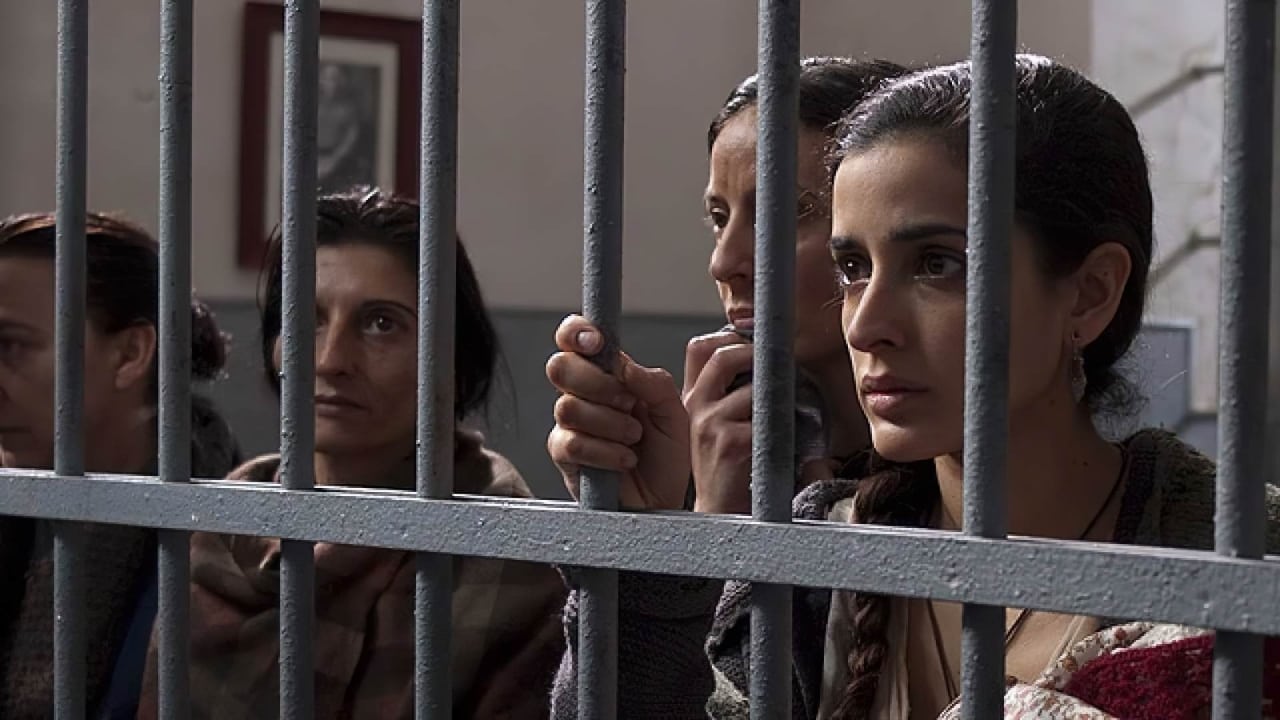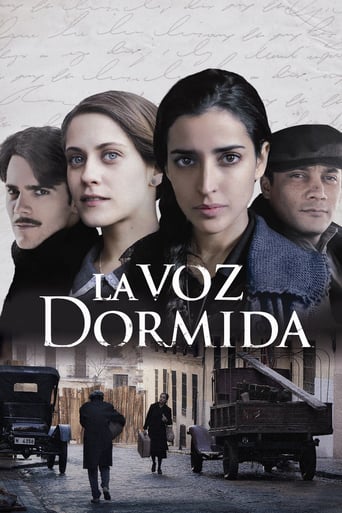

Save your money for something good and enjoyable
... View MoreHorrible, fascist and poorly acted
... View MoreA Major Disappointment
... View MoreBlistering performances.
... View MoreSince the release of the Spanish film, La voz dormida, on October 21st of 2011, the film has received praise and critique from many viewers. Director Benito Zambrano created a post-Spanish Civil War drama focusing on two young women. The film was nominated for nine Goya Awards including Best Film and won two for Best Supporting Actress and Best New Actress in 2012. Adapted from the book La voz dormida written by Dulce Chacón, the film does an excellent job portraying the Spanish novel about 1940s Madrid. Following the Spanish Civil War, there was still large controversy between Franco's followers and those that rebelled against his ruling. Paulino (Marc Clotet) and Felipe (Daniel Holguín) play the roles of Spanish rebels fighting in the mountains. Hortensia, (Inma Cuesta) wife of Felipe, is pregnant in a women's jail for helping the rebellion. The story line follows Pepita, (María León) sister of Hortensia, in her efforts of helping her sister and the rebels. Hortensia is given the death sentence after her birth, giving Pepita time to do everything she can to save her sister. In the meantime, she and Paulino fall in love after working together.In general, the film was well directed and executed. For a viewer with limited knowledge on the Spanish Civil War and the politics surrounding it, the plot and production of La voz dormida did an excellent job of portraying the hardships following the war. The entire film was dark and dramatic, allowing the viewer to understand the cold and hard times during this era in Spain. With limited light and happy occurrences in the film, the two-hour long drama was difficult to watch at times. However, the acting through all parts, including the handsome Paulino, brings light into the movie. The emotion in the actors allows the viewer to feel for the characters and understand their hardships. As a viewer that does not enjoy war films, Zambrano does an excellent job drawing viewers in and keeping their attention in this emotional film.Overall, I highly enjoyed the film. Although at times it was dark and difficult to watch through scenes of hardship and injustice, the film is an excellent portrayal of strong women lead roles in Franco's 1940s Madrid. I have never enjoyed war films, but as a more dramatic portrayal of the war, Zambrano allows viewers to feel the emotional pain of the Spanish people rather than their physical pain. I was left with tears in my eyes and feeling attached to the characters after watching this film. I was also left thinking about the film wanting to watch more. I recommend this movie to those who enjoy mild action, intense emotions, and a little bit of a sappy love story. Combined, these aspects brought the movie together to become a well-rounded film surrounding the Spanish Civil War. As more than simply a war story, the drama brings in many different themes throughout to identify the reality after the war.
... View MoreAnother story set in the grim beginnings of the "New Spain" during the drab winter of 1940, as the victorious nationalists rounded up their defeated opponents to be jailed and in many cases shot. Where this film differs is that it concentrates on the women, being set mostly in a Madrid prison where we see both republican inmates, some with babies, and the staff keeping them there, who are wardresses under the command of nuns. The role of the church in supporting the regime comes under heavy criticism. That Franco's rule was thoroughly unpleasant from the start is taken as given and even after 70 years little attempt is made at balance, for this is the story of the victims. Touching moments from the two principals, Inma Cuesta and Marìa Leòn, playing sisters in their late teens who learn painfully what dignity and courage mean. Their men are communist guerillas in the mountains, one of whom is tortured to death and the other sentenced to 30 years.Sombre prison interiors and grey wintry exteriors convey the gloom that prevails, intensified by a sparse soundtrack. Only occasional flashes of bravery and of compassion lighten the tense oppressive atmosphere.
... View MoreI could not take my eyes off the scene throughout the movie.It is so breath-taking and it throws me into such rage against the inhumanity of the Franco administration. The ending scenes of Hortensia breast-feeding her new born baby before she was taken out to be shot would forever be woven into my mind.The Spanish Civil War was one of those wars which were largely forgotten. People thought that since the Nazis were defeated, they had achieved their purpose. Perhaps it was not wise to ask for another war to purge the world of the remaining dictator who gave so much sorrow to the Spanish people. But little was done even if we discounted military action.And in the film, the position taken up by the Church was simply disgusting. There was a line in the film: Spain would be free if there is no more Church or tyranny. Well, one of them is gone. Let us hope the days of the remaining one is numbered.The performance of Imma Cuesta is just great! And thanks to Benito who brought up another great film for us.
... View MoreDramatic picture about the consequences of Spanish civil war , being realized with academicism and general coldness . Madrid, 1940 , the Cordoba girl named Pepita (Mary Leon) comes to the capital , Madrid, to be near her sister, Hortensia (Inma Cuesta), pregnant and in prison of Ventas , she is framed as a rebellion convict , and subsequently is condemned to Death Row . She meets Paulino (Marc Clotet) , an evaded Guerrillero del ¨Maquis¨ and bourgeouis origin who fights in the Sierra and Pepita fall in love with him .¨La Voz Dormida¨ results to be other of the innumerable stories to deal with dramatic deeds regarding the Civil War background . A familiar theme about the global horrors of a fratricide war , impossible to forget to our cinema . "The voice asleep¨, adapted from the novel by Dulce Chacón and directed by Benito Zambrano entered the Spanish selection for Oscar being finally superseded by other flick in similar tendency , "Pa Negre (black bread)" .Benito Zambrano (Solas , Padre Coraje , Habana Blues) , also writes the script along with with Ignacio del Moral, filmed in his usual formal and stylistic scholarship , without leaving a trace the thought-provoking issues , in terms of dramatic and narrative excitement .Including a spotless pictorial cinematography by Alex Catalan (Even the rain , Camino , Room in Rome) and a willingness , almost perfect of the elements of each shot , every sequence, every space, the main problem has to face "The voice asleep", beyond not being able to avoid falling into the politic pamphlet is precisely derived from the coldness of its staging, which eventually become monotonous over two hours of footage . Because the story needs a vibration more real than the one offered in this slow-moving and sometimes boring film .But anyway, its is compensated with the great performances from Maria Leon and Inma Cuesta , interpreters who provided a considerable boost to the result . Zambrano is a great director of actors and the main players are complemented by a good cast of secondaries (Ana Wagener, Berta Ojea , Lola Casamayor, Lizarralde , Susi Sanchez , Myrian Gallego , among others) forming a powerful human group of women and giving excellent interpretations .In the 26th Annual Goya Awards , presented by the Academia De las Artes y Ciencias Cinematográficas De España (Spanish Academy of Cinematographic Arts and Sciences), main national film awards, considered by many in Spain, and internationally, to be the Spanish equivalent of the American Academy Awards , ¨La Voz Dormida¨ won deservedly , prize to Best New Actress (Mejor Actriz Revelación) María León , being nominated the best director Benito Zambrano , furthermore , Maria Leon Won Silver Seashell Best Actress in San Sebastian International Film Festival .
... View More